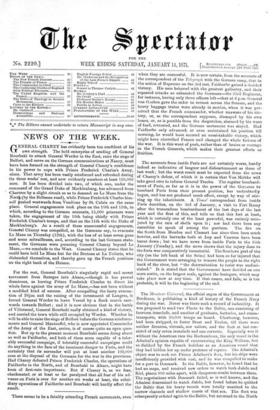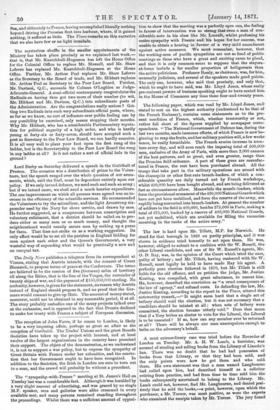The illoniteur Universel, the official organ of the Government at
Bordeaux, is publishing a kind of history of the French Navy during the war. Never was there such a record of imbecility. It was proposed to send two Fleets to the Baltic, one consisting of fourteen ironclads, and another of gunboats, batteries, and steam- transports, with 30,000 troops on board. Cherbourg, however, had been stripped, to foster Brest and Toulon, till there were neither firearms, victuals, nor sailors, and the fleet at last con- sisted of only seven ironclads and one corvette. Especially was it without the American ram the Rochambeau, the only vessel in the Admiral's opinion capable of encountering the King William, but so disliked by the French builders as an American vessel that they had hidden her up under pretence of repairs. The Admiral's object was to seek out Prince Adalbert's fleet, but his ships were insufficiently provided with coal, and he was compelled to make for a port in Denmark. In the Baltic, however, he found that ho had no maps, and received new orders to watch both Jande and Kiel, places 900 miles apart, with dangerous straits between them. The negotiations with Denmark failed, as is well known, and the Admiral determined to watch Jande, but found before he quitted the Baltic that his heavy vessels were totally unsuited to the narrow channels and shallow coasts of that sea. The fleet was subsequently ordered again to the Baltic, but returned to the North Sea, and ultimately to France, having accomplished literally nothing beyond driving the Prussian fleet into harbour, where, if it gained nothing, it suffered as little. The Times remarks on this narrative that we also have few or no light ironclads.



































 Previous page
Previous page